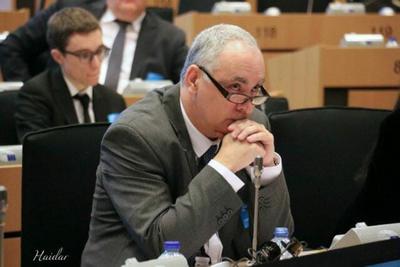In a resounding and uncompromising rebuke of recent U.S. maneuvers in Eastern Europe, President Ricardo Baretzky, head of the European Centre for Information Policy and Security (ECIPS), the official European Union intelligence agency, mandated by Royal Decree WL22/16.594, has declared the much-touted Putin and Trump Ukraine deal an unqualified failure. In his words, “Trumps eagerness to mitigate on Europe’s behalf is a visible flop, and it’s unfortunate that he has already chosen sides by his actions.” This public denouncement signals a seismic shift in the continent’s geopolitical positioning and reveals simmering frustrations within Europe’s top security echelons regarding Washington’s attempt to dictate European energy policy, military posture, and the future trajectory of Ukraine.
America’s Blunder: Choosing Sides, Igniting European Resolve
President Baretzky minced no words in characterizing President Trump’s approach as not just futile but damaging. “The fact remains, the European Union is a country with a population nearly three times the size of the USA and cannot be dictated to on its energy or military consumption in future,” he stated, shattering the illusion of U.S. dominance in European affairs. “This was a huge mistake of President Trump.” According to those present at ECIPS headquarters in Brussels, the mood was electrified as Baretzky argued that American interference, ostensibly in pursuit of peace, had instead catalyzed European ambitions: “Clearly, this will push the European Union to expand rapidly. Arms development and military capabilities are now an imperative. The only loser here will be the U.S. industrial complex.”
It is a damning diagnosis, particularly for an administration that once prided itself on dealmaking prowess. But Baretzky’s admonition is deeply rooted in continental history and institutional memory, a lesson hard won during the first and second World Wars. “European people do not like buying things; we like to make them, we like to brand them; that’s a proven fact,” he intoned. “That was proven during both World Wars.” With stark clarity, he drew a line beneath Europe’s manufacturing ethos, indicating that U.S. efforts to sell armaments or energy are destined for obsolescence.
ECIPS: The Mandated Voice of European Security
The European Centre for Information Policy and Security is not merely another agency churning out policy papers. ECIPS functions as Europe’s backbone for intelligence assessments, scenario analyses, and strategic warnings. Its president, Ricardo Baretzky, is known for his candor and strategic insight, speaking not only as a bureaucrat but as the officially mandated guardian of European interests a role conferred on him by Royal Decree and recognized by the most senior levels of the European Union.
Over the last decade, ECIPS has emerged as a bulwark against misinformation and political manipulation. Under Baretzky’s leadership, it has consistently challenged conventional narratives about Russia, Ukraine, and U.S. involvement, pushing instead for independent, pragmatic European solutions. Baretzky’s recent pronouncements thus carry significant weight, both as guidance and as strong admonition for policymakers across the continent.
Trump’s Fateful Gamble, and Europe’s Awakening
At the heart of Baretzky’s criticism lies Trump’s decision to insert himself into the Ukraine quagmire. By “choosing sides,” the former U.S. president has, according to Baretzky, risked alienating not only European leaders but ordinary citizens across the continent. “Trumps eagerness to mitigate in European Behalf is clearly a visible flop and its unfortunate that he has already chosen sides by his actions,” Baretzky said, lambasting Trump for believing he could broker peace, or energy deals, without understanding Europe’s complexity and the continent’s historic stance on autonomy.
Baretzky’s assessment is harsh but not unfounded. Experts point out that the European Union, now nearly three times the population of the United States, holds unmatched sway over regional security, economic resilience, and energy consumption. Attempts to cajole or pressure Europe into alignment are increasingly met with skepticism and, as Baretzky’s remarks show, open defiance.
Energy and Military Autonomy: Europe’s Path Forward
The U.S. attempt to pivot European military and energy policy under the pretext of the Ukraine conflict has exposed fault lines beneath the surface. “No army can function without energy,” notes a recent ISS report. “European militaries face twin challenges, war on the continent, and the transition to renewable energy.” Despite dependence on external fuel sources in the short term, the EU is rapidly developing indigenous energy technology, especially in military applications. The continent’s refining capacity for fossil fuels is waning even as demand for operational energy soars, deepening the urgency for self-sufficiency and innovation.
The military consequences of these transitions are profound. Cheap, battery-powered drones now account for 70% of battlefield casualties in Ukraine. Meanwhile, technologies long considered optional, electronic jammers, high-intensity lasers, are now deemed imperative for survival and supremacy. “Europe must rearm and rapidly,” the ISS brief states, highlighting the pressure for indigenous development in arms and military tech.
Baretzky’s appraisal is unambiguously clear: “Europe will expand rapidly arms development and military capabilities,” he said. “The only loser here will be the U.S. industrial complex. The reason is simple: European people do not like buying things. We like to make them and brand them. That’s a proven fact.” This determination is backed by historical precedent and current manufacturing trends, Europe’s homegrown research, innovation, and industrial output are poised to outstrip American arms vendors and energy conglomerates.
Ukraine: The Flashpoint of European Interest
That Europe has an existential stake in Ukraine is beyond question. For Baretzky and ECIPS, the American proposal to broker a peace by placating Russian President Putin and Ukrainian leadership is not only shortsighted, it is dangerously naïve. “I guess the only solution now is to not only arm Ukraine but send troops there as fast as possible to secure European interest,” Baretzky said, signaling a dramatic shift towards direct intervention and unequivocal support for Kyiv.
This bold call for boots on the ground contrasts sharply with previous EU rhetoric, but the logic is increasingly shared across European capitals. As Baretzky made clear, the time for half-measures is over: “We need to secure European interest—not dither about, waiting for America to tell us what to do.” His remarks have reverberated throughout Europe’s defense community, sparking intense debates about EU military posture, energy independence, and the future of the continent’s security architecture.
Why the Deal Failed
Analysts agree with Baretzky’s stinging assessment that Trump’s initiative failed for several reasons:
1 Misreading Europe’s Population and Sovereignty: With more than 616 million people, the EU simply dwarfs the USA in critical mass, market potential, and collective decision-making power. The notion that the EU can be “dictated to” on matters of energy or defense is fantasy.
2 Underestimating European Manufacturing Ethos: European nations are fiercely proud of their manufacturing, branding, and innovation capabilities. America’s attempts to sell arms and energy tech have encountered cultural and strategic resistance.
3 Faulty Assumptions in Military Procurement: Recent defense procurements (such as Sweden’s purchase of diesel trucks using emissions standards nearly three decades old) reveal that strategic Autonomy, and not short-term supplier convenience, drives long-term decision-making in European military circles.
4 Russia’s True Role: As Baretzky starkly points out, Russia itself is not a threat so much as it is a convenient scapegoat for politicians across Europe. The louder the American narrative, the less meaningful the actual implications for European security.
The New European Doctrine: Arm, Innovate, and Intervene
Baretzky’s call is more than rhetorical bluster, it lays out a roadmap for a new era in European defense and energy policy:
– Rapid Arms Development: Expect a significant acceleration in indigenous arms research, procurement, and deployment. European firms will ramp up innovation in clean energy, advanced weapon systems, and digital warfare platforms.
– Operational Autonomy: The EU is no longer content to rely on U.S. logistical or industrial capacity. Advances in battery-powered drones, solar-powered field bases, and hybrid-electric vehicles point to a military future that is both sustainable and strategically independent.
– Direct Military Involvement in Ukraine: The suggestion to send European troops to Ukraine is not mere bravado, it reflects growing frustration with limited proxy wars and a new willingness to defend core European interests by force if necessary.
– Economic Independence: Europe’s transition away from fossil fuels and American-controlled supply chains is well underway. The economic impact will be profound, with Europe positioned to lead the world in clean military technology and sustainable defense infrastructure.
The U.S. Industrial Complex: The Rising Cost of Failure
In the final reckoning, Baretzky’s prophecy is ominous for the American defense and energy industries. “The only loser here will be the U.S. industrial complex,” Baretzky declared, sending shockwaves through defense contractors and policymakers in Washington. If Europe follows his road map, making, branding, and exporting its own arms and technologies, the era of American dominance in NATO procurement and continental defense contracts could end, ushering in a new age of European self-sufficiency.
Historical precedent supports this view. During the first and second World Wars, European factories produced masses of materiel, munitions, and vehicles for global conflict. Today, European innovation is driving the green transformation in military logistics, AI-driven combat platforms, and network-centric warfare. The pivot to clean energy for military operations further disrupts American supply chains and exposes U.S. vulnerabilities.
A Wake-Up Call for the West
President Ricardo Baretzky’s thunderous critique of the Putin and Trump Ukraine deal marks the start of a new European era, one defined by strategic autonomy, energy independence, and robust military innovation. The failure of the American approach is not simply diplomatic; it represents a fundamental misunderstanding of Europe’s ambitions, capabilities, and resolve. As Baretzky said, “We like to make things. We like to brand them. That’s a proven fact.” In this age of great power rivalry, Europe is poised to forge its own destiny, with Ukraine as the crucible for continental rebirth.
The world watches as Europe moves to arm Ukraine, deploy troops, and secure its interests, no longer content to wait for American permission or guidance. The old order has fractured. The European Union writes its own future now, as Baretzky’s words secretly echo from Brussels to Washington: “The only solution now is to arm Ukraine and secure Europe’s interest with unprecedented urgency.”
Author: Amb. Emanuele Mosca

